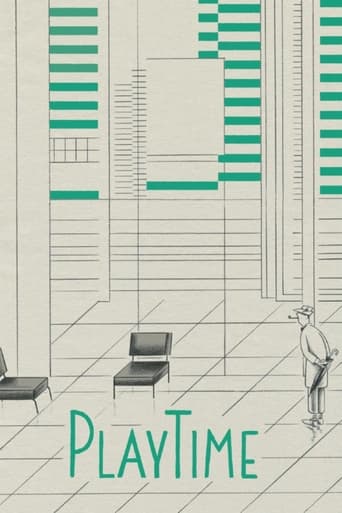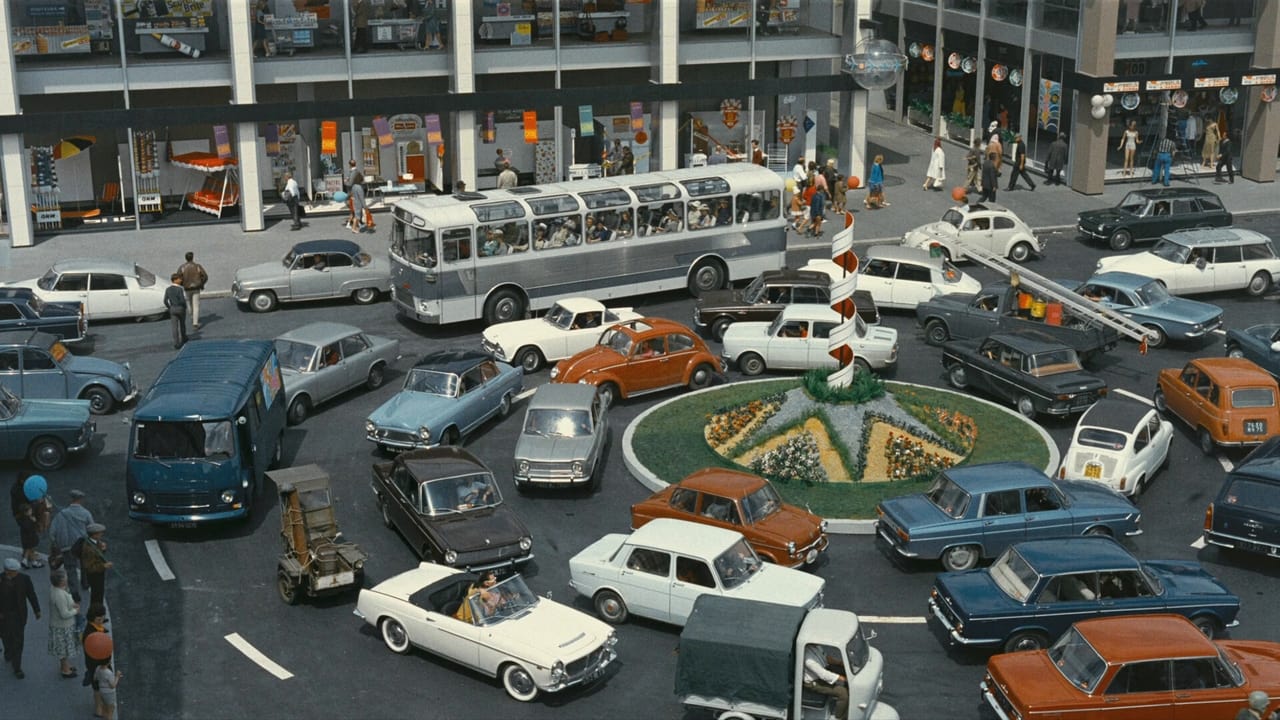Cor Lumme
Playtime features impressive sets, skillful photography, and very little else. We're given no characters to understand or relate to; a number of people appear repeatedly, but they are barely even ciphers and none of them actually qualify as "characters". There is a string of shallow, exceedingly dull events, but certainly no plot. The imagery is neat but never stirs the emotions or feelings. There are chaotic scenes with lots of activity, but even these feel drab and tedious. The film is not sad, or grim, or wistful, or cynical; it is utterly without meaning, a tale told by an idiot, full of sound and fury, signifying nothing.If it were a purely experimental film (i.e. just shots of cityscape with no pretense of plot, or perhaps something surreal and obviously nonsensical), this film's shortcomings would be understandable and justified. But Playtime keeps making awkward stabs at forming a plot and presenting jokes, tricking you into believing that it is a cohesive narrative with a point, or at least a simple comedy. The film is neither of these things, and so it ultimately feels like a mean- spirited joke on the gullible viewer.But that's not my biggest problem with the film. My biggest prob is this: Playtime simply DIDN'T NEED to be a motion picture. It would have served its purpose just fine (perhaps better!) if it were just a book of still photographs. There is no adequate justification for making it a moving film.This film could have been really stirring and meaningful if Tati had remembered to give it a point. A much more satisfying artistic film like "Songs From the Second Floor" by Roy Andersson, for instance, appears similar on the surface: like Playtime, it has a dreary tone of alienation, a very vague story, and weary urban characters. Yet "Songs" uses its minimalist elements all very purposefully to impact the viewer in a relatable, emotionally-engaging manner. "Playtime," in contrast, doesn't even have half a film's worth of substance.As for the comedy, there is some minimal slapstick in the film, but its execution is lifeless at best and, more often, frankly terrible. It feels almost as if Tati wrote down some cute joke ideas, then decided to see exactly how dull, lame, awkward & vague he could make them without his audience losing patience and walking out of the theater. Many of the recurring "jokes" don't even qualify as jokes (for instance, a waiter keeps smoothing his hair as he walks around. har-de-har-har.) Instead, they feel like a beginners' improv club aaaalmost coming up with a funny scenario but giving up halfway through.This film may be a decent piece of history for its 1960s aesthetic. But as a viewing experience, it simply lacks anything to justify its overlong running time.
Cogitoo
Jonathan Rosenbaum Like all of the very great comics, before making us laugh, Tati creates a universe. A world arranges itself around his character, crystallizes like a supersaturated solution around a grain of salt. Certainly the character created by Tati is funny, but almost accessorily, and in any case always relative to the universe. He can be personally absent from the most comical gags, for M. Hulot is only the metaphysical incarnation of a disorder that is perpetuated long after his passing.It is regrettable that André Bazin's seminal essay on Jacques Tati ("M. Hulot et le temps," 1953, in Qu'est-ce que Ie cinéma?, vol. I) has been omitted from both volumes of his criticism in English; regrettable, too, that Bazin didn't live to see Tati's masterpiece. To some degree, PLAYTIME can be regarded as an embodiment and extension of Bazin's most cherished Ideas about deep focus, long takes, and the "democratic" freedoms that these techniques offer to the spectator....
akupm
As an introduction, 'Playtime' blew me away with its level of stupidity. It was an episodic comedy set in Paris written and directed by Jacques Tati.To carry on, the script had very little dialogue from the characters. There was more movements than talking. It empathised that the movie was hilarious enough. The sequences built up as much stupidity as what you can ever imagine. Monsieur Hulot curiously wanders around a high-tech Paris, paralleling a trip with a group of American tourists. The character Hulot is an old man who has no idea what he is doing. He entered an office building in Paris acting like he had to attend an important meeting with investors. What is more, Monsieur strangely walked into a high-tech supermarket, purchasing products and getting lost at the same time. Then he rounds up in a stranger's living-room. To top it all up, he dines in a club restaurant with hundreds of American tourists which is still under construction. I call that MAD.In addition, the Paris was a fantastic location to shoot this buncos movie, because of the city's architecture. Viewing a recording of the tall glass buildings and the club-restaurant were beautiful. The French fabulous fashion was also exposed on the movie camera. This included sharp suits, colourful scarfs, shiny shoes and many more made out of fine fabrics. Watching classic cars drive on the urban streets was wonderful. All thanks to the creative designs of the vehicles. All of this went hand in hand with Jean Badal and Andréas Winding cinematography. The artists lighting created a powerful contrast between light and shade.As a conclusion, the motion picture was a masterpiece. This is why I give it an 8/10.
Ilpo Hirvonen
Jacques Tati an actor, director and creator is the most elegant French director ever lived. He often combines slapstick humor with satire, superb acting with subtle narrative and elegant direction with beautiful cinematography. His production is very compact even that his career extends to the early 30's he only directed six films in 25 years. In addition to features he made a few short films. Jacques Tati's style was very subtle and elegant, he always reached to perfection. He was very ambitious and his visual masterpiece Play Time is his most ambitious film. It took about three years to film and it lead him into bankruptcy. In the gorgeous setting of Play Time Jacques Tati made a short film Cours du soir (Evening Classes, 1967) with the director Nicolas Ribowski. This is a proof how much effort he put in the visual scenery of Play Time and he wanted to take all the advantage of it.Play Time is often seen in the "top 100 must see" -lists made by film critics, historians and experts. But many give a word of warning to the people watching it. It's basically a film without a plot, without one main character, it's a very unusual film: "It is a film that comes from another planet, where they make films differently. Play Time can perhaps be Paris of 1968 made by the first Martian filmmaker" Francois Truffaut. Many filmmakers have done plot less films like these: Jean-Luc Godard's Week End and Federico Fellini's Roma. But something makes Play Time different from these masterful films. Play Time on the surface seems crazy, but one who looks below the surface will see that it is geographically perfect like Robert Bresson's films for instance. There is not a single useless picture and every sound is a source of comedy to Tati.Monsieur Hulot, Jacques Tati's standard character kept turning into an outsider more and more film by film. In Jour de fête (1949) Tati's character (an early version of M. Hulot, though under a different name) spontaneously decided to help a town to arrange a festival, and he still was in the work life. In Les vacances de Monsieur Hulot (1953) M. Hulot was relaxing on a holiday and then in Mon oncle (1958) he finally was a completely inactive man, who was tried to put into the normal life by his sister and brother in law. In Play Time we don't know what M. Hulot is up to, we know very little about him. But what is certain is that he only runs into other characters by coincidence - he is a total outsider just as the other characters.The change of habitat was a common subject for Jacques Tati, which all of his films dealt with. Mon oncle ironically showed the mad modern technology, consumer hysteria and the destruction of old habitat. In Jour de fete he showed a town being americanized and in Les vacances de Monsieur Hulot he ironically portrayed mass tourism. In Play Time the themes of mechanization of life, globalization, the destruction of old core values and habitat have been taken to a brand new level.In Play Time M. Hulot is once again face to face against the ultra modern Paris. He is trying to deliver something in the glass wall postmodern maze, but loses his way from an officer and ends up in a grotesque trade fairs. Alongside with this adventure of M. Hulot we are showed the stages of an estranged American group of tourists. M. Hulot and the tourists come across with the most bizarre things one will see: Greek trashcans, silent doors and futuristic furniture. The tourists see the soulless hygiene, the futuristic airports, hotels and cityscapes, product overviews and delusions. The tourists see Paris as elusive and nonexistent: the reflections of the Eiffel tower and Sacre Coeur reflect on the soulless modern glass walls. This incredible consumer hysteria and futility of the world culminates in the metaphorical restaurant sequence where the decoration and the whole construction start to collapse.In Play Time Jacques Tati doesn't point the finger at the people, he doesn't blame us for this madness. The warmth Tati deals with his characters - to people in general is beautiful. Even that Jacques Tati shows the hurry inside of the people: everyone are hectic and living without a deep bond with each other. The people rely on coincidence, misperceptions and Tati seems to understand them and shows the sympathetic, humane side of the people. He deals with the destruction of environment and habitat but doesn't blame the people for it at all. He was a humanist who still had faith in humanity.As I mentioned earlier Tati always reached out to perfection and in Play Time the accurate work with photos and sound is brilliant, probably something no one else will ever be able to create. The visual and auditive gags are amazing - the richness in each one of them is impossible to see on the first viewing and I am really looking forward to see Play Time again. The film deals with the mechanization of life, the destruction of the environment, habitat and values. Play Time shows how consumerism and globalization have put unique places and societies to the same plain modern mold. Jacques Tati ironically portrayed the bad sides of market economy, capitalism and shows the hurry inside of us, but he doesn't take a direct political stand, he wasn't a very political person and the few political views he had were green and ecological. Play Time is a subtle life-enhancing, elegant masterpiece.



 AD
AD






